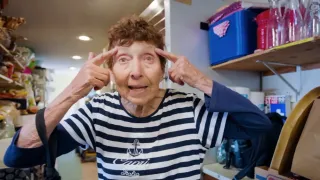April 27, 2021
Review: 'Nomadland' Travels Through Social, Economic Margins
Megan Kearns READ TIME: 3 MIN.
Chloé Zhao's beautiful, aching, and powerful drama "Nomadland" stars Frances McDormand as Fern, a woman living in her van and traveling the Western U.S.
Van dwelling is incredibly popular right now, along with tiny house living. As more and more people contend with the rising costs of housing and economic collapse, people seek unconventional homes. But rather than a mere trendy choice, for many, mobile homes are a salvation. Exquisitely and masterfully crafted, "Nomadland" examines the struggles and serene beauty of nomadic living. Visually poetic and lyrical, it's a sensitive depiction of grief, humanity, economic struggles, and the meaning of home.
Written, directed, and edited by Chloé Zhao, "Nomadland" is based on Jessica Bruder's book. Critically acclaimed, the film "won the Golden Lion at the Venice Film Festival" and the People's Choice Award at the Toronto International Film Festival. Zhao makes films ("Songs My Brothers Taught Me" and "The Rider") about people not typically depicted onscreen. Her films are languorous, empathetic, and respectful to these communities.
Much of "Nomadland" consists of following Fern live in her van (which she named "Vanguard") and her routines: Cooking and eating, looking at old photos, cleaning and doing repairs, and even going to the bathroom. She used her deceased husband's fishing tackle box as a storage container, which holds her prized possession: Dishes from her dad. Fern lost her husband, her job, her home, and even her town of Empire, Nevada, as we learn in the film's opening text. It's an unspeakable amount of loss. She keeps moving forward. Fern lives her life on her own terms, the way she wants. Frances McDormand gives an outstanding, soulful performance. She melts into the role, truly inhabiting the character with small gestures and touches.
Intriguing and eccentric characters populate the film. Aside from actors McDormand and David Straitharn (whose character is a fellow van-dweller whom Fern grows close to), nearly everyone on-screen who lives out of their van isn't an actor, but they're essentially playing themselves. People share their pain-filled stories: A woman has cancer and doesn't want to die in a hospital, so she travels instead; a veteran with PTSD says he "can't handle" crowds and loud noises; a woman contemplated suicide, stopped by the desire to care for her dogs; a woman says, "I didn't want my sailboat to be in the driveway when I died. And it's not. My sailboat is out here in the desert."
Filmed in Nevada, South Dakota, Nebraska, Arizona, and California, the gorgeous cinematography by Joshua James Richards (who's worked on Zhao's other films) highlights the majestic landscapes. Many scenes are filmed at sunrise or sunset, which provides stunning natural light and a vivid color palette. It also reifies the film's themes of liminality – existing on the periphery and margins of society, living a nomadic lifestyle.
Fern and others in the film live out of their vans to live simpler and save money. But Fern still struggles financially, and she's nearly stymied when her van breaks down. She grapples with finding full-time work, not having worked full-time since her town's economy collapsed. She works various part-time jobs throughout the film: An Amazon fulfillment center, a diner, a park. "We gladly throw the yoke of the tyranny of the dollar on, and live by it our whole lives," says Bob Wells, who teaches others about van life. Fern and others are trying to live differently. At a cookout at her sister Dolly's house, Fern disagrees with her brother-in-law and his co-worker about the boon of real estate. She says, "It's strange that you encourage people to invest their whole life savings, go into debt, just to buy a house they can't afford."
"Nomadland" sublimely explores the notion of home. What exactly is home? One of Fern's co-workers at Amazon talks about her tattoo which states: "Home – is it just a word? Or is it something you carry within you?" This could be the film's thesis. Is home a physical place or is it a state of mind, a sense of comfort and peace within yourself?
Fern runs into someone she knows who asks if she's homeless. "No, I'm houseless but not homeless. Not the same thing." As she restlessly travels, Fern wrestles with her grief. In a moving scene (that brings me to tears every time I think about it), Fern laments to Bob that perhaps she spent too long reminiscing the past, rather than living in the present. He talks of grief and says that in van life, "there's no final goodbye." Instead, people say, "I'll see you down the road."
We each yearn for our place in this world, for a sense of belonging. For Fern, she finds herself out on the open road.
"Nomadland" is available on Blu-ray and DVD today!






